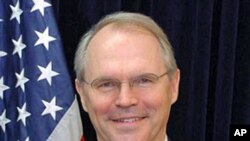Three weeks after Iraq's national elections, U.S. Ambassador to Iraq Chris Hill says onlookers are closely following the ways political blocs could merge and regroup in an effort to gain enough power to build a coalition government.
Results are not yet certified, but an unofficial complete tally of the elections has two centrist parties in the lead. Former prime minister Ayad Allawi's Iraqiya party has 91 seats, and current Prime Minister Nouri al-Maliki's State of Law Coalition is only two seats behind with 89.
Related video report by Deborah Block:
Speaking to reporters in Washington via satellite from his office in Baghdad, Ambassador Hill said Iraqi politicians are working to put together coalitions to gain a clear majority. He explained that while Mr. Allawi's Iraqiya party might have a two-seat advantage at the moment, Mr. Maliki's coalition could still come out ahead.
"If Mr. Maliki's coalition is able to merge with another element, they could end up with more seats than Iraqiya," said Ambassador Hill. "And therefore, they would have the first crack at forming a coalition."
Ambassador HIll said he believes it is too early to tell how this will play out. He explained that political observers are split as to whether Mr. Allawi or Mr. Maliki or even a third politician will be able to build a broad-enough coalition to garner more than 50 percent of parliament's 325 seats.
"So there is a lot of talk about if these top two candidates are not able to form a government, whether or who would be a third possibility," he said.
Prime Minister Maliki has said he does not accept the results of the March 7 election. But that does not appear to have dampened Hill's praise for the poll, which he called "very credible."
"I will say that, you know, as in any close election, you know, it's not easy to lose a close election. If you look at the - the differential, it was, you know, 0.045 percent," said Hill. "You know, that's not fun to lose an election like that. So I don't think people should be too surprised that there's some comments that reflect the - you know, the anguish of losing."
There were concerns that there would be an uptick in violence post-election or evidence that Iraq's neighbors, namely Iran, would interfere with the formation of the Baghdad government.
Hill said there has not been an increase in attacks. And he said that while Iraq's neighbors naturally are interested in the Iraqi government, he has not seen evidence of a rise in meetings between officials from Iraq and its border nations.
Still, he said, a number of countries have strong views about the kind of government they would like to see in Baghdad.
"But I think the Iraqi people have even stronger views, and I don't think the Iraqi people would stand for a government that is not homemade," said Christopher Hill.
Hill said Iraqis are more concerned about seeing economic development and improved services such as electricity than they are with what he called "the high politics of dealing with Iran." The U.S. ambassador also said that any Iraqi politician who ignores the will of the people "would be making big mistake."
Hill says the new parliament is expected to take its seats in late April.




